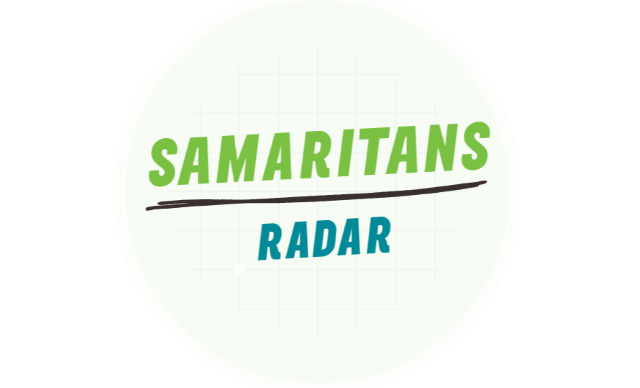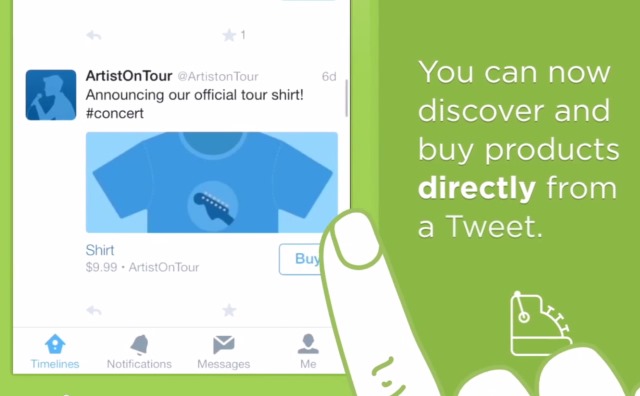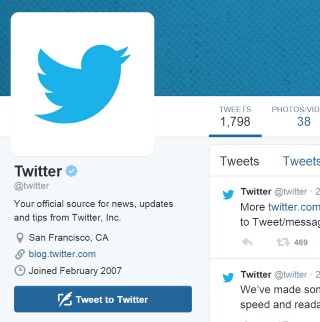
IBM and Twitter join forces to improve enterprise decision making
Twitter provides a unique window into public thinking and that can be useful for businesses, not only to see what people are saying about them but also to get an insight into market trends.
In order to help enterprises understand their customers and markets, IBM and Twitter have announced a partnership that will allow Twitter data to be used in IBM's cloud-based analytics platforms.

Samaritans Radar puts Twitter users on suicide watch
We all go through difficult times, and it can often be hard to cope with what life throws at us. Whether you're going through a particularly tricky patch and feeling low, or you're struggling with depression, it can be helpful to know that there are people you can talk to. But reaching out to people can be hard and it often falls to friends to notice signs of someone in trouble so they can be there when required.
Everyone would like to think they would notice when a friend starts to post worrying messages online, but the sheer volume of content we all consume each day means that it is easy to miss something important. Suicide prevention charity, Samaritans, has launched a new online venture, Samaritans Radar, which monitors the Twitter feeds of those who sign up, looking out for "potentially worrying tweets".

Twitter: Your Twitpic photos and videos are safe... for the time being
After flip-flopping between closing, then not closing, and finally closing, Twitpic has now shut up shop. But that's not quite the end of the story. There had been rumors flying round that Twitter was going to buy the image and video hosting service, but that ultimately amounted to nothing. The latest twist in the story is that Twitpic and Twitter have come to an arrangement that means content that has already been uploaded is safe. For now, at least.
In a statement on the Twitpic blog, founder Noah Everett explains that a deal has been struck with Twitter. What this amounts to is Twitpic handing over the domain and content archive to Twitter. This will keep "the photos and links alive for the time being".

Microsoft co-founder Paul Allen pledges $100 million to tackle Ebola
Saying "the Ebola virus is unlike any health crisis we have ever experienced and needs a response unlike anything we have ever seen," Paul Allen, co-founder of Microsoft, pledged millions of dollars to help tackle the virus. The billionaire philanthropist increased his commitment to "at least $100 million" and called on others to contribute as well.
Ebola has now claimed the lives of more than 5,000 people, and Allen is keen to help fund not only heathcare professionals and treatments, but also the evacuation of international aid workers. Allen's #TackleEbola website is being used as a hub to raise money for a number of individual projects and causes such as household protection kits and hand-washing stations.

Twitpic really IS closing, and the deadline is tight to back up your data
Twitpic was closing, then it wasn't. But now the champagne corks have been well and truly push back into the bottle after news of an acquisition turned out to be a false alarm. Users now have just one week to export their photos and data before Twitpic closes for good on 25 October. Company founder Noah Everett used the Twitpic blog to break the news, explaining that the photos and video sharing service will shut up shop in a week's time.
The last month and a half has been something of a rollercoaster ride for Twitpic and its users. After a trademark application dispute, the original closure announcement came on 4 September with the closure planned for 25 September. A lifeline appeared just two weeks later when it was announced that a buyer had been found.

The battle to wipe out revenge porn continues
In the wake of the Fappening, online porn and nudity has been thrust into the public consciousness once again. But porn is about much more than titillating celebrity photos -- even if research shows that we're finding it easier to waste our time online when we should be getting on with work. Revenge porn is on the rise, and steps are being taken to try to thwart its progress. As the Fappening showed us, taking saucy pictures of oneself or partner is far from uncommon. This is fun and exciting in the middle of a relationship, but if that relationship should break down, there's no knowing what could happen to those pictures and videos.
Disgruntled partners may decide to get revenge on their former lovers by sharing those intimate photos and movies online, or it may be obtained by a third party and used as a tool for bribery. Many US states have outlawed the practice, and now the UK is following suit.

Twitter walks the walk -- sues the United States Government
I am a very patriotic American; my love for my country is unending and unwavering. However, nothing is perfect and no entity is without mistake, including the United States Government. Sure, there are times when being transparent is not possible, such as telegraphing military movements -- soldiers should never be put at risk. With that said, American citizens arguably deserve full transparency on other things, such as government requests that can impact their privacy.
Twitter is trying to be as open and transparent as possible; however, the US government is blocking that desire. Previously, the company talked the talk, saying "we are weighing our legal options to provide more transparency to our users". Today, the social network walks the walk and sues the government, fighting for the right to be open with its users -- free from government intervention.

Right to Be Forgotten hits social networks hardest [Infographic]
The "right to be forgotten" is something that was expected to take Europe by storm. A court ruling gave people the right to get in touch with search engines like Google and Bing to ask that results relating to them be removed -- assuming they are "inadequate, irrelevant or no longer relevant". One of the services that popped up after the ruling was Forget.me, making it simple to submit removal requests.
Three months down the line, we have access to the first set of figures relating to requests, and they show that social networks are the most affected type of website.

MIT wants to use your Tweets to solve society's problems
Twitter is handing MIT full access to its real-time public stream and archive, as well as $10 million over five years to help with its research into social patterns across the media. The data MIT gathers from a variety of media platforms will be used to reveal interaction patterns and shared interests between users, while it develops new collaborative tools and mobile apps for public communication and social organization.
Dick Costolo, CEO of Twitter said: "With this investment, Twitter is seizing the opportunity to go deeper into research to understand the role Twitter and other platforms play in the way people communicate, the effect that rapid and fluid communication can have and apply those findings to complex societal issues".

Panic over! Twitpic is given a stay of execution after a buyer is found
Twitpic will no longer close on 25 September as the photo sharing service has found a buyer. There's not yet any word on who is behind the acquisition, but the takeaway news is that photos should be safe as Twitpic will live to fight another day.
Just a couple of weeks ago, founder Noah Everett posted the news that Twitpic was to close following something of a legal tussle with Twitter. But things have taken a turn for the better. After users scrabbled to download their images to ensure they were safe, it now transpires that the service is not going anywhere.

Twitter tests 'Buy' button to allow purchasing via tweets
It has been the subject of speculation for some time now, but today Twitter finally announces that the rumored "Buy" button will soon be making an appearance in timelines. The feature has been made public through a blog post that explains that the button will initially be pushed to "a small percentage of US users", but reassuring everyone else that coverage "will grow over time".
What does this mean? Well, that you will be able to buy things via tweets, essentially.

Twitpic is closing. You have three weeks to grab your photos and videos
Image and video sharing service Twitpic is closing its doors. Threatened with loss of access to the Twitter API if the company refused to abandon a trademark application, Twitpic has decided it does not have enough clout to take on the microblogging giant. Twitpic founder Noah Everett used a blog post to break the news and give a little background to help explain the move. He stressed that the closure was a difficult decision and thanked users for their support.
The problem seems to stem from Twitpic's name. Everett explains that the company was contacted by Twitter a few weeks ago and asked to give up on the trademark application. The timing is a little strange because, as Everett points out, Twitpic's name has been in use since 2008, and the trademark application was filed the following year. The company managed to fight opposition from some parties, but it seems as though Twitter dealt the killer blow.

91 percent of Americans concerned about online privacy -- 7 percent would change their name as protection
There are lots of reasons to be concerned about privacy online -- not least the spying carried out by the NSA and other governmental agencies. While some companies are trying to stick up for the rights of their customer, many web users have now taken to censoring themselves. New research by WP Engine shows that the level of paranoia is higher than many people may have thought -- a staggering 91 percent of Americans are concerned about their online privacy. This is interesting in itself, but the steps that web users are willing to take if they feel their privacy is threatened makes for particularly interesting reading.
Of course there are some people who would take things to the extreme, going as far as changing their name in a bid to protect their privacy, but others would take slightly less drastic action. In fact only five percent of those surveyed say they would take no action to protect their privacy. The most common reaction to feeling threatened is to change passwords (79 percent of people), but some would go further, admitting they would consider changing their email address (48 percent) or change their credit cards (48 percent). Well over a third of those surveyed (42 percent) said they would be willing to delete all of their social media accounts. Three percent of people indicated that they would even move house as a result of having their privacy threatened online.

Twitter CEO says it's your own fault you see tweets from people you don't follow
Many Twitter users have become frustrated by a problem with the social network. Increasing numbers of people are finding that they see tweets from people they do not follow. Twitter CEO, Dick Costolo, has an explanation: it's your own fault. He's not talking about promoted tweets or anything like that, but tweets that have been favorited by people you follow. The explanation came over the weekend in a couple of tweets in which Costolo put the appearance of such tweets down to users' impatience.
Freelance science writer Katie Mack pointed out that Twitter feeds now include "random tweets from people others follow, ads, other people's favs". Costolo replied:

Buy your next Dell computer using Facebook, Twitter, Google+ or LinkedIn
Social media is a necessary evil for many. Even if you want to stay away from services like Facebook, staying in contact with friends and family may keep you tethered. I have tried to get away from Facebook many times, but much like Al Pacino in Godfather 3, "Just when I thought I was out...they pull me back in!" However, I do rather enjoy services like Twitter and Google+.
Regardless of your opinion of social media, there is one thing you cannot deny -- accessing other sites with your social media login credentials is very convenient. The idea of creating a unique username and password for every site you visit is foreign to many younger internet users. Today, Dell announces that it too is jumping on the bandwagon, by letting customers sign in and buy computers with their social media credentials.
